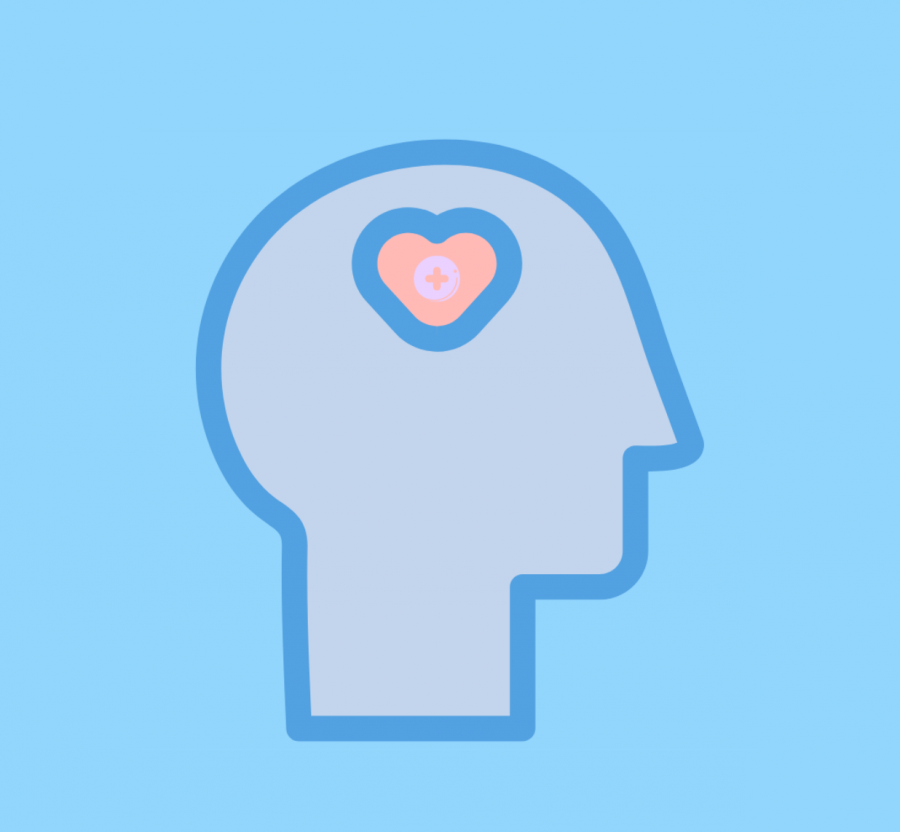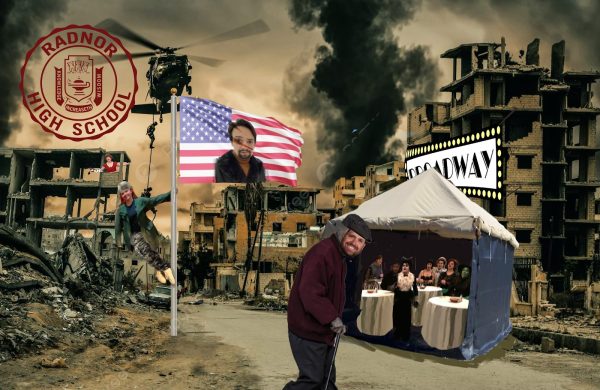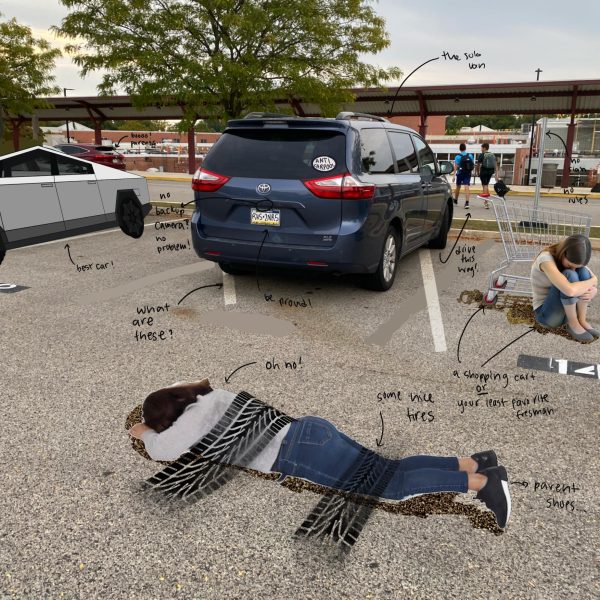Mental Health in 2020: The Virus, Racism, and the Election
January 18, 2021
2020. COVID-19. Millions infected and hundreds of thousands dead. Businesses closing. Events canceled. Quarantines.
2020. Racism. Yet another person killed by the police. Calls for solutions and change.
2020. The election. Saving grace or nightmare. Legitimacy in doubt, yet nonetheless safe. Lawsuits.
2020. Our well-known icons passing away. Kobe Bryant. John Lewis. Chadwick Boseman. Ruth Bader Ginsburg. Alex Trebek. All gone.
2020. It was a lot.
Mental health is something that directly affects our thought processes, our emotions, our actions, and more. But, why are people shunned from talking about it? And why should we talk about this right now?
This should be talked about since the concept was created. Mental health remains such a stigmatizing topic that many people with a mental health condition do not seek treatment. Meanwhile, almost 20% of adults and 17% of youth experience some sort of mental illness each year —before COVID-19. It is important especially now with the coronavirus pandemic contributing to surges in diagnoses. It is important as the nation reckons with its own racism and many other forms of discrimination. And, it is important as the election’s subsequent political chaos prompts anxiety.
For one, the pandemic has implications beyond the virus itself: the social impacts, quarantine, closing businesses, etc., and of course, general uncertainty. I remember back in March when school was about to close that I had an overfilled crate of questions in my head and I desperately tried to talk to as many friends as possible before school officially closes. In other words, I tried to talk to as many friends as possible like a person hoarding toilet paper.
Saturday, Sunday, and Monday passed as if it was just another three-day weekend. One week later, though, I first confronted the prospect of staying home and hunkering down. Seconds seemed like hours. Classmates and friends of mine tried the best they can to pass the time—snacking up, binge-watching Netflix, creating social media trends, Bill Clinton Swag, and more. The house became a shield and a prison. On the flip side, though, it gave me plenty of time to catch up on schoolwork (there were no six-hour zoom sessions in my previous school) and other activities, including binge-watching movies and TV shows. My time sleeping finally met the recommended level. So there was something to satisfy boredom.
Meanwhile, events across the board were canceled or postponed en masse, from concerts to comedy shows. Sports seasons that would have been hosted during that time were either canceled or postponed. Businesses of all sorts closed, either to mitigate COVID spread or for going out of business. Many have closed permanently, with livelihoods gone.
Meanwhile, cases and deaths surge horrifically. Right now, the US is reporting over 200,000 cases a day (get the current update here), and more Americans are dying each day than 9/11. Grandparents, parents, brothers, sisters, relatives, friends, mentors are infected or dead. Because of that, there’s grief — and a lot of it.
Meanwhile, this created a second crisis: mental health. More specifically, increasing depression, anxiety, loneliness, grief, and much more. It’s normal to feel stressed or a bit fearful in quickly changing circumstances; after all, certainty is something humans crave. But it becomes problematic when these feelings are chronic and severely impacts one’s life.
A study done by the Boston University School of Public Health shows that depression diagnoses more than tripled since before the pandemic: 27.8% during vs. 8.5% before. Further, another study shows that those who contracted COVID are twice as likely to experience a mental health problem than those who haven’t. As the latter source remarks, “Given the novelty and scope of the pandemic, there is little-to-no framework, particularly during the lifespan of the majority of the population alive, for how to manage the threat to health, lifestyle, and societal change,” says Jessica Stern, PhD, a psychologist and clinical assistant professor with the Department of Psychiatry at NYU Langone Health.
These mental health conditions can even outlast the pandemic. For about 10-15% of people, life may not return to normal for them after the rest of us can stop wearing face masks.
We remember the old adage, “there is always light at the end of the tunnel.” Fortunately, with a coronavirus vaccine approved for emergency use, there’s a light we can see. Unfortunately, though, we can expect to wait months or years before getting it. In the meantime, the pandemic is still going on, and we still ought to wear masks and social distance. In any case, we’re still uncertain if we’ll get our pre-pandemic lives back or if pre-pandemic life as we knew it will never return.
“I can’t breathe!” George Floyd pleaded as he was being brutally choked to death. Racism in America is not new, but it became especially prevalent after the horrific murder of George Floyd, Breonna Taylor, Rayshard Brooks, and other people by the police. Protestors took to the streets calling for action, sparking a nationwide reckoning with racism in America. Indeed, racism exists in many forms as the reckoning reveals. Individually, racial aggression can be as overt as explicit slurs and as subtle as “Where are you really from?” However, an often overlooked effect of racism is that of mental health.
A former classmate of mine said that racism has “impacted my mental health a lot. Going to a PWI (predominantly white institution) as a person of color already affects my mental health, but on top of that, COVID has affected it so much more for the worse.” As they shared, it’s not just being in a place with little representation. It is seeing people clutch their purses; it is seeing the killing of someone like you by the police justified; it is being viewed as less innocent, and much, much more.
A mental health condition may be equally common for white people and people of color, though the latter often receive inferior treatment, allowing the condition to persist. In fact, rates of PTSD are often higher for people of color than for whites. This is coupled with the fact that only 1 in 3 African-Americans and Latinos who need mental health care receive it, and for those who do, the communication is 33% less centered towards the patients’ needs. Racism exists in mental health care just like anywhere else, and it’s not surprising how many Blacks report mistrust in mental health care due to this.
Historically, when it comes to racism, psychology has often been used as a justification for all sorts of discrimination, segregation included. In fact, when slavery was active in America, one physician at that time literally invented a “psychiatric disorder” to describe escaping enslaved people. And at least one of the invented “disorders” resided in books like the Practical Medical Dictionary as late as 1914, almost 60 years since slavery was abolished. Such “disorders” and other ideas ensured that Black patients, if they were to receive treatment, were treated poorly. Remember Jim Crow segregation? It did not spare the mental health care industry, either.
Certain diagnosable disorders and their terminology have also evolved over time. Sometimes, they can take on a racist caricature. Take schizophrenia, for example. Its definition evolved from a less harmful condition prior to the Civil Rights Movement to one that encompassed “aggression,” further creating a demonizing stereotype of Black people. This caricature was cited to justify things like police brutality, mass incarceration, and more.
How does the history of racism and mental health relate to the present day? For one, controlling for symptoms, Black people are more likely to be incorrectly diagnosed with schizophrenia than whites. Mental illnesses like it were and are used to justify such practices like mass incarceration. It is still active—over two million people are in jail or prison in this country. And police brutality is still rampant.
Another former classmate of mine said, “It is heartbreaking to see any death, but as a minority, to be targeted and disproportionately killed by police can definitely take a large toll on a person’s mental health.”
In addition to the Black community, many Asian communities are also severely affected by racism — especially during the pandemic. A study done by Cary Wu et al. says, “we find that Asian Americans and Asian immigrants reported having encountered more instances of COVID-19-related acute discrimination than whites. Asian immigrants and Asian Americans also experienced higher levels of mental disorders during the pandemic.” They further state, “Our findings suggest that Asians worldwide may have to deal with not only the COVID-19 crisis but also the associated stigmatization, violence, and discrimination. Therefore, they are particularly vulnerable during the crisis.”
Angry Americans have routinely routinely attacked Asian people, accusing them of spreading the virus and using other slurs that I won’t name. A third classmate of mine, a young Asian woman, shared how, “I remember in the beginning I was reading about how Asian people were getting attacked on the streets randomly and to be honest, it kind of scared me at first thinking that it could happen to me or my family if we go out.” 1 in 4 Asians can associate with that now with the pandemic going on. A fourth classmate, who is another young Asian woman, added, “Now that school has started, although school is hybrid and virtual at the moment, I am certain that when school returns to normal, racism demonstrated at school will have increased due to COVID.” (Radnor High School is currently running a virtual/hybrid model at phase 2.)
And of course, for these minorities, their already marginalized status means that their mental health conditions are often exacerbated and go untreated.
Much ado about the election, which was far from nothing. Many people say this election was like no other. I remembered my heart racing on election night as I anxiously watched the states turn red or blue. I endured news reports of election challenges and a sortie of lawsuits, and the electoral college bar akin to spells colliding. This continued for days until Joe Biden was announced the winner.
Nearly 70% of Americans reported a similar feeling. In the meantime, 2020 has created new problems, tore the curtains off the old, and was a termite chewing a house’s roof; the only thing was that we didn’t notice the hole for so long.
Much ado about lawsuits. So far, over 50 lawsuits were filed challenging the election results, and almost all of them lost. As news outlets reassured us of how all these challenges to the election would fail, the uncertainty nonetheless caused anxiety. It’s a tradition for losers to concede — just listen to John McCain’s concession speech for an example — but Trump being Trump, he declined to, instead opting for legal challenges. Presidential precedents are often taken for granted, but it’s only this year (and throughout Trump’s presidency) that they were often broken or jeopardized.
Much ado about hope. At least there’s one good thing that came from the 2020 election: turnout. Americans turned out in record numbers — over ⅔ of eligible voters voted this year, which is roughly 160 million people. Early voting also broke records, with over 100 million voters casting their ballots early. In some cases, there were so many votes that it drowned ballot sorters — but at least we got accurate results. Speaking of accurate results, federal election officials have said that the 2020 election was the most secure in American history — despite dubious voter fraud claims.
For many of us, anxiety is usually the result of a sports match or a high-stakes test. Did my favorite team win? Will I score high on this test? Am I accepted into this university? These things understandably cause anxiety, but share one thing in common: they shape our individual, not collective, lives. Americans feel not just afraid for themselves, but for our democracy, our institutions, our nation — collective anxiety, to say the least.
2020 was truly tough for all of us. Sometimes it’s new challenges and issues; sometimes it’s old issues worsened. But here’s the thing: if there wasn’t light at the end of the tunnel, the Great Depression would still be going on, every pandemic that has ever happened would still happen and just pile up, and the ozone layer would have a much, much larger hole. Thankfully, the Great Depression is over (even though we’re in another economic crisis), COVID-19 is the only pandemic currently going on (aside from other public health crises), and the hole in the ozone layer is getting smaller (but we’re still in a climate crisis that demands much-needed action). In the meantime, there are still some ways to cope. Here’s some:
(1) Try talking it out. Share your emotions, your mental health conditions, your frustrations, and your anxieties. Talking it out can help release them and lessen the burdens they have on you, compared to bottling them up.
(2) This pandemic is going to end. Just remember that. Especially with a vaccine in the corner, life will return to a normal sometime in the future. In the meantime, keep wearing a mask and continue social distancing.
(3) If you feel like the news is making you more anxious, take a break! You can do other activities too, like talking to friends, going for a walk, etc. While we all want to catch up in the latest news, sometimes hearing bad news after bad news is really stressful.
(4) You’ve survived a lot in your life. Whether it is friend trouble, or a low grade, or something else, you survived it, and you will survive this, too. One thing I tell myself whenever I get a poor grade is, “Even Harvard admittees failed a test before.” So just remember, you will survive this.
(5) Remember the stress and anxiety presentation that we watched? You can try out some of their ways to cope!
It can be hard to find positivity and hope during these tough times. But hope is there. In fact, 2021 has already begun. If there’s a positive note I want to end this article with, it is a few lyrics from the song “You Will Be Found” from the Dear Evan Hansen musical:
“Even when the dark comes crashing through,
When you need a friend to carry you,
And when you’re broken on the ground,
You will be found.
So let the sun come streaming in,
‘Cause you’ll reach up and you’ll rise again!
Lift your head and look around,
You will be found!”







